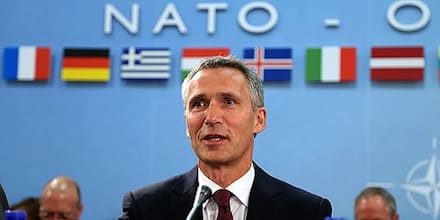NATO on Tuesday doubled down on its pledge to eventually admit Ukraine during a meeting of the alliance’s foreign ministers in Bucharest, Romania, a position that played a major role in provoking Russia’s invasion.
The Romanian city was where NATO initially made the promise to Ukraine back in 2008, and at the time, US officials acknowledged that attempting to bring the country into the alliance could spark a war in the region.
“We made the decision in Bucharest in 2008 at the summit,” NATO Secretary-General Jens Stoltenberg said on Tuesday. “I was there … representing Norway as Prime Minister. I remember very well the decisions. We stand by those decisions. NATO’s door is open.”
In a joint statement, the NATO foreign ministers, including Secretary of State Antony Blinken, said that they “reaffirm” the decisions that were made at the 2008 Bucharest summit.
CIA Director William Burns wrote a cable in 2008, when he was the US ambassador to Russia, that said promising NATO memberships to Ukraine as well as Georgia touches a “raw nerve” in Russia and raises serious security concerns for Moscow.
Burns wrote: “Not only does Russia perceive encirclement, and efforts to undermine Russia’s influence in the region, but it also fears unpredictable and uncontrolled consequences which would seriously affect Russian security interests.”
Burns said in the cable, which was released by WikiLeaks, that Russia was particularly concerned about Ukraine. “Experts tell us that Russia is particularly worried that the strong divisions in Ukraine over NATO membership, with much of the ethnic-Russian community against membership, could lead to a major split, involving violence or at worst, civil war. In that eventuality, Russia would have to decide whether to intervene; a decision Russia does not want to have to face,” he wrote.
The pledge to admit Ukraine into NATO didn’t lead to a civil war right away, but one was sparked after former Ukrainian President Viktor Yanukovych was ousted in a US-backed coup in 2014. Separatists in the eastern Donbas region rejected the more Europe and US-friendly post-coup government and declared independence.
Starting after Yanukovych was ousted, NATO began a deep partnership with Ukraine by sending troops to train the country’s military, and the US began providing Kyiv with anti-tank missiles during the Trump administration. Yahoo News revealed earlier this year that the US deployed CIA paramilitaries to the frontlines of the Donbas war in 2014 to train Ukrainian forces.
During the lead-up to Russia’s February 24 invasion, Russia presented the US with a list of security demands. Chief among them was the issue of NATO expansion, which Russia wanted to be rolled back. Moscow was also seeking a guarantee that Ukraine won’t ever join NATO, but the US refused to entertain the idea even though President Biden had acknowledged that Kyiv wouldn’t be joining the alliance anytime soon.
Shortly after Russia’s invasion, Ukrainian President Voldymr Zelensky said he was told privately that Ukraine won’t be joining NATO. “I requested them personally to say directly that we are going to accept you into NATO in a year or two or five, just say it directly and clearly, or just say no,” Zelensky said in March. “And the response was very clear, you’re not going to be a NATO member, but publicly, the doors will remain open.”
While NATO doesn’t plan on admitting Ukraine as a full member anytime soon, the alliance has big plans for the country. POLITICO reported in October that NATO is developing a 10-year plan to rebuild Ukraine’s military and arms industry with a focus on shifting the country from using Soviet equipment to primarily using NATO weapons. The report said the plan would make Ukraine a “default” member of NATO, a situation that will never be acceptable to Russia.
Reprinted with permission from Antiwar.com.


